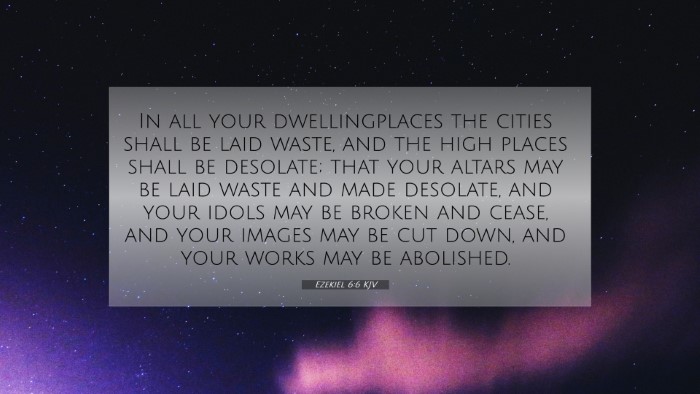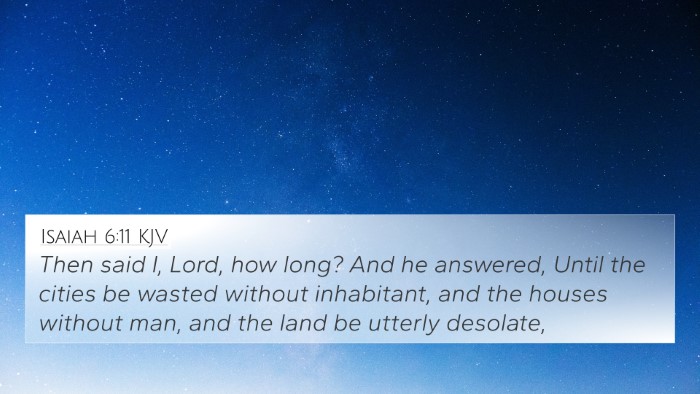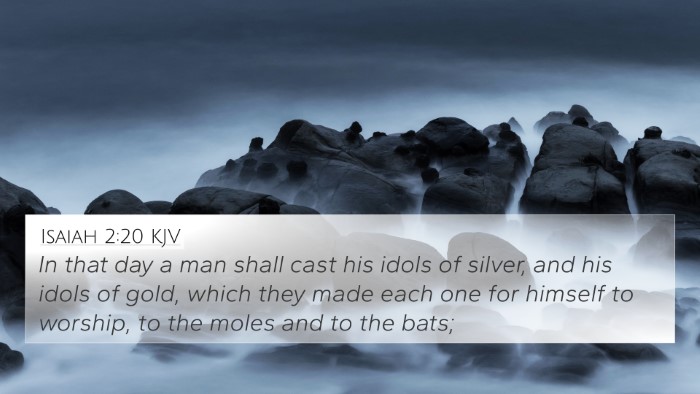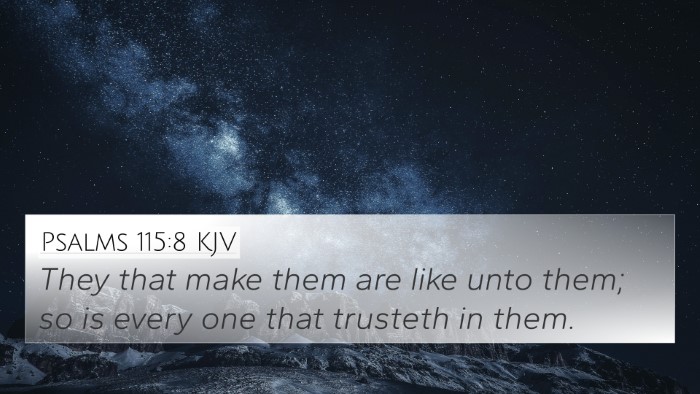Ezekiel 6:6 - Interpretation and Meaning
Bible Verse: Ezekiel 6:6
Verse Text: "In all your dwelling places the cities shall be laid waste, and the high places shall be desolate; that your altars may be laid waste and made desolate, and your idols may be broken and cease, and your images may be cut down, and your works may be abolished."
Context and Overview
Ezekiel's prophecies occur during a tumultuous period in Israel's history, specifically during the Babylonian exile. In Ezekiel 6, the prophet is addressing the consequences of Israel's idolatry and unfaithfulness to God. This particular verse focuses on the devastation that will come as a result of their sins, emphasizing the complete destruction of places of worship and idols.
Insights from Public Domain Commentaries
Matthew Henry's Commentary
Henry notes that Ezekiel's message articulates God's displeasure with the people's idolatry. The "high places" referred to locations where the Israelites worshipped false gods, often in direct defiance of God's commandments. The prophet conveys that these sites will be devastated as a part of God's judgment against them. This destruction serves as both punishment and a means to redirect the people's hearts back to God.
Albert Barnes' Notes on the Bible
Barnes emphasizes that the destruction of the cities and high places symbolizes a comprehensive judgment upon the nation due to their spiritual adultery. The idols, representing the false deities the Israelites have turned to, will be utterly demolished, indicating a complete rejection of what they had previously worshipped. This purging is necessary for the restoration of true worship among the remnant who may still seek God.
Adam Clarke's Commentary
Clarke adds that the laying waste of cities serves to illustrate the extent of God’s wrath, wherein every aspect of their communal and religious life will be overturned. The reference to their “works” being abolished suggests that not only their physical idols but the very practices of idol worship will cease. Clarke views this prophecy as a strong call for the people to repent and reflect on the futility of their idolatrous practices.
Thematic Connections and Cross-References
This verse strongly relates to themes of judgment, repentance, and the sovereignty of God over falsehood. Below are related cross-references that deepen our understanding of Ezekiel 6:6:
- Jeremiah 7:30-34 - Discusses the defilement of places of worship in Judah.
- Isaiah 30:22 - Speaks of the destruction of idols and their significance.
- 2 Kings 23:24-25 - Details King Josiah's reforms, which included the destruction of idolatrous practices.
- Hosea 10:2 - Indicates the fall of Israel’s idols and the people’s unfaithfulness.
- Amos 5:21-24 - God rejects the worship of His people because of their injustice.
- Romans 1:23-25 - Discusses the exchange of God's glory for images and the consequences of such actions.
- Revelation 21:27 - Refers to the exclusion of the unclean and irreverent from God's presence.
Understanding the Verse Through Comparative Analysis
Connecting Ezekiel 6:6 with other scripture allows readers to discern a pattern of God's response to idolatry throughout the Bible. Each cross-reference exposes different facets of God's character—His holiness, justice, and desire for restoration among His people. This cross-referenced approach reveals the consistent biblical message that spurning true worship leads to divine consequence.
Exploring Inter-Biblical Dialogue
The connections between Ezekiel’s warnings and Christ’s teachings underscore the continuity of God’s message. For instance, Christ’s condemnation of the Pharisees in Matthew 21:12-13 illustrates how false worship can take root in even the most sacred spaces. The thematic links showcase God's unwavering call to repent and return to authentic worship.
Practical Applications and Tools for Study
For those interested in developing a deeper understanding of biblical texts and their connections, a variety of tools are available:
- Bible Concordance: Useful for locating specific verses and their themes.
- Bible Cross-Reference Guide: A resource that lists related scriptures for thematic study.
- Cross-Reference Bible Study: Methods to analyze verses collectively to draw theological insights.
- How to Use Bible Cross-References: Guides explaining methodologies in cross-referencing scriptures effectively.
- Bible Chain References: A system that links verses around specific themes for enhanced understanding.
- Comprehensive Bible Cross-Reference Materials: Books and tools that facilitate detailed studies of connected scriptures.
Conclusion
Ezekiel 6:6 serves as a stark reminder of the consequences of turning away from God and the futility of idol worship. Through careful study and cross-referencing with other scriptures, believers are called to consider their commitment to God and challenge the places in their lives where they may be tempted to worship false idols. The study of this verse can lead to a richer understanding of God’s character, His expectations, and His longing for genuine relationships with His people.


























